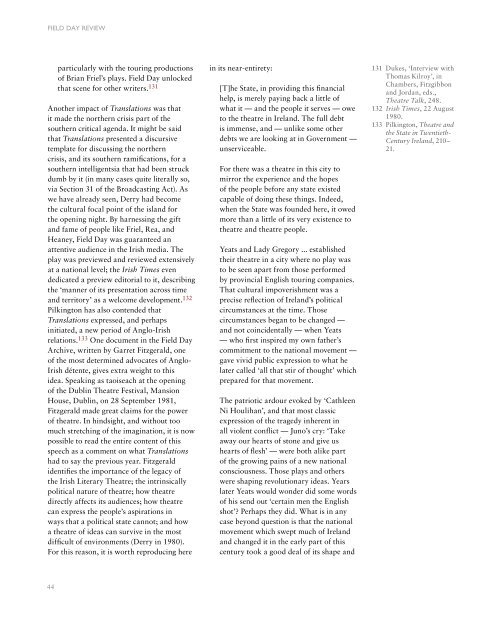cd on translations
cd on translations
cd on translations
You also want an ePaper? Increase the reach of your titles
YUMPU automatically turns print PDFs into web optimized ePapers that Google loves.
FIELD DAY REVIEW<br />
particularly with the touring producti<strong>on</strong>s<br />
of Brian Friel’s plays. Field Day unlocked<br />
that scene for other writers. 131<br />
Another impact of Translati<strong>on</strong>s was that<br />
it made the northern crisis part of the<br />
southern critical agenda. It might be said<br />
that Translati<strong>on</strong>s presented a discursive<br />
template for discussing the northern<br />
crisis, and its southern ramificati<strong>on</strong>s, for a<br />
southern intelligentsia that had been struck<br />
dumb by it (in many cases quite literally so,<br />
via Secti<strong>on</strong> 31 of the Broadcasting Act). As<br />
we have already seen, Derry had become<br />
the cultural focal point of the island for<br />
the opening night. By harnessing the gift<br />
and fame of people like Friel, Rea, and<br />
Heaney, Field Day was guaranteed an<br />
attentive audience in the Irish media. The<br />
play was previewed and reviewed extensively<br />
at a nati<strong>on</strong>al level; the Irish Times even<br />
dedicated a preview editorial to it, describing<br />
the ‘manner of its presentati<strong>on</strong> across time<br />
and territory’ as a welcome development. 132<br />
Pilkingt<strong>on</strong> has also c<strong>on</strong>tended that<br />
Translati<strong>on</strong>s expressed, and perhaps<br />
initiated, a new period of Anglo-Irish<br />
relati<strong>on</strong>s. 133 One document in the Field Day<br />
Archive, written by Garret Fitzgerald, <strong>on</strong>e<br />
of the most determined advocates of Anglo-<br />
Irish détente, gives extra weight to this<br />
idea. Speaking as taoiseach at the opening<br />
of the Dublin Theatre Festival, Mansi<strong>on</strong><br />
House, Dublin, <strong>on</strong> 28 September 1981,<br />
Fitzgerald made great claims for the power<br />
of theatre. In hindsight, and without too<br />
much stretching of the imaginati<strong>on</strong>, it is now<br />
possible to read the entire c<strong>on</strong>tent of this<br />
speech as a comment <strong>on</strong> what Translati<strong>on</strong>s<br />
had to say the previous year. Fitzgerald<br />
identifies the importance of the legacy of<br />
the Irish Literary Theatre; the intrinsically<br />
political nature of theatre; how theatre<br />
directly affects its audiences; how theatre<br />
can express the people’s aspirati<strong>on</strong>s in<br />
ways that a political state cannot; and how<br />
a theatre of ideas can survive in the most<br />
difficult of envir<strong>on</strong>ments (Derry in 1980).<br />
For this reas<strong>on</strong>, it is worth reproducing here<br />
44<br />
in its near-entirety:<br />
[T]he State, in providing this financial<br />
help, is merely paying back a little of<br />
what it — and the people it serves — owe<br />
to the theatre in Ireland. The full debt<br />
is immense, and — unlike some other<br />
debts we are looking at in Government —<br />
unserviceable.<br />
For there was a theatre in this city to<br />
mirror the experience and the hopes<br />
of the people before any state existed<br />
capable of doing these things. Indeed,<br />
when the State was founded here, it owed<br />
more than a little of its very existence to<br />
theatre and theatre people.<br />
Yeats and Lady Gregory ... established<br />
their theatre in a city where no play was<br />
to be seen apart from those performed<br />
by provincial English touring companies.<br />
That cultural impoverishment was a<br />
precise reflecti<strong>on</strong> of Ireland’s political<br />
circumstances at the time. Those<br />
circumstances began to be changed —<br />
and not coincidentally — when Yeats<br />
— who first inspired my own father’s<br />
commitment to the nati<strong>on</strong>al movement —<br />
gave vivid public expressi<strong>on</strong> to what he<br />
later called ‘all that stir of thought’ which<br />
prepared for that movement.<br />
The patriotic ardour evoked by ‘Cathleen<br />
Ni Houlihan’, and that most classic<br />
expressi<strong>on</strong> of the tragedy inherent in<br />
all violent c<strong>on</strong>flict — Juno’s cry: ‘Take<br />
away our hearts of st<strong>on</strong>e and give us<br />
hearts of flesh’ — were both alike part<br />
of the growing pains of a new nati<strong>on</strong>al<br />
c<strong>on</strong>sciousness. Those plays and others<br />
were shaping revoluti<strong>on</strong>ary ideas. Years<br />
later Yeats would w<strong>on</strong>der did some words<br />
of his send out ‘certain men the English<br />
shot’? Perhaps they did. What is in any<br />
case bey<strong>on</strong>d questi<strong>on</strong> is that the nati<strong>on</strong>al<br />
movement which swept much of Ireland<br />
and changed it in the early part of this<br />
century took a good deal of its shape and<br />
131 Dukes, ‘Interview with<br />
Thomas Kilroy’, in<br />
Chambers, Fitzgibb<strong>on</strong><br />
and Jordan, eds.,<br />
Theatre Talk, 248.<br />
132 Irish Times, 22 August<br />
1980.<br />
133 Pilkingt<strong>on</strong>, Theatre and<br />
the State in Twentieth-<br />
Century Ireland, 210–<br />
21.


